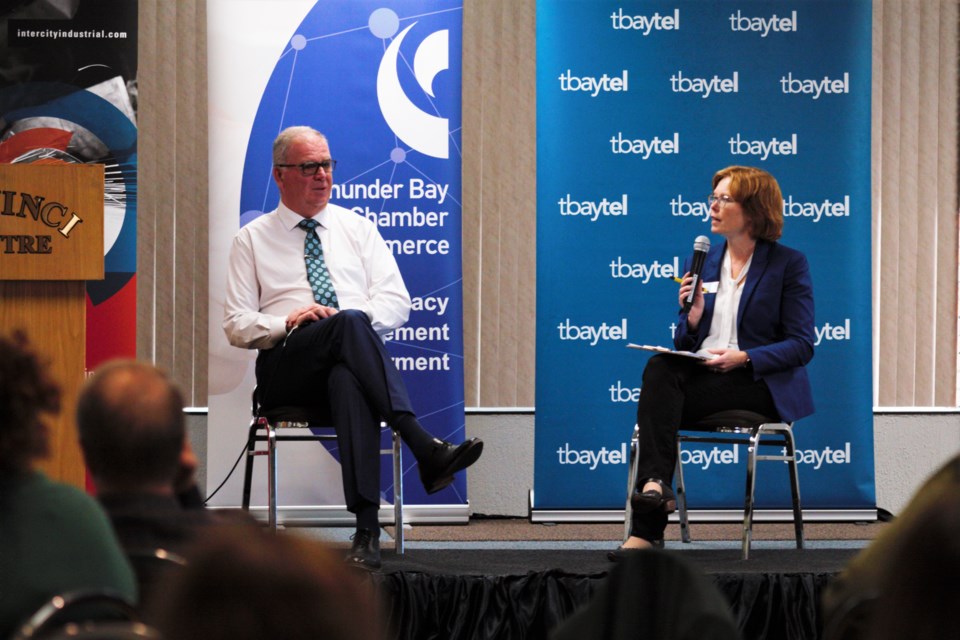THUNDER BAY — City manager Norm Gale defended the municipal government’s record on topics from taxes to housing development at a Thunder Bay Chamber of Commerce event on Tuesday.
He also used the forum to warn that the likely imposition of strong mayor powers later this year will drastically change how the city makes decisions, saying the transition will impact citizens and businesses alike.
Gale was the keynote speaker at the chamber’s latest Leaders Luncheon, which invites government and business leaders to speak to and take questions from Thunder Bay’s business community.
Around 60 people attended the event at the Da Vinci Centre on Tuesday, including representatives from local businesses, Lakehead University, Confederation College, and the city.
Gale touched on topics like the 2024 budget, strong mayor powers, and infrastructure in his speech, underlining his view that the funding model for municipalities is broken.
“Every municipality in Ontario needs a new deal,” he said. “Our costs are outpacing our ability to draw revenue to pay for the programs and services you both rely on and enjoy.”
“We simply can’t keep doing what we’re doing. There’s no world that exists where you have modest or zero tax increases, great public services, and reliable modern infrastructure. Something has to give, somewhere.”
Chamber president Charla Robinson, moderating the event, quizzed Gale most prominently on a hefty tax hike planned for 2024, and whether the city has done enough to reduce barriers to growth like new housing developments.
“A 5.5 per cent tax increase is not going to go over very well with the business community,” she said, referring to a target set by city council.
Gale responded that municipalities across the province and country were struggling to balance budgets without either significant tax increases or service cuts, while the tax hike target set by council would spare any major cuts.
“That is a significant increase. I acknowledge that,” Gale said. “But in my view… it is in concert with what’s happening in the world around us, and what’s happening to municipalities in Ontario, Canada, and the Western World.
“It sounds trite… but tough decisions have to be made and sometimes that tough decision is a larger-than-usual tax increase to maintain and protect those programs and services.”
Gale also warned the 5.5 per cent tax hike target could change, if Mayor Ken Boshcoff chooses to exercise strong mayor powers he’s likely to have as of Oct. 31, which include setting the proposed budget.
“At this time, that is what we’re working on,” Gale said. “That could change, depending on how strong mayor powers roll out.”
Speaking the day after council symbolically rejected Boshcoff’s push for strong mayor powers, Gale called the move “the biggest change in municipal governance I have seen in my career.”
Whether, and how, Boshcoff chooses to exercise the powers will have profound impacts on local decision-making, he predicted.
“Mayor Ken Boshcoff has the ability and the authority to do what he chooses when it comes to strong mayor powers,” he said. “But I think it’s really important that stakeholders — people who do business with the city, people who live and work in the city — understand what this actually means.”
Robinson asked Gale to respond to concerns from developers that city housing and development policies serve as barriers to growth.
Specifically, Robinson cited what she called a “long and costly process to get a building permit,” and city taxation policies regarding new subdivisions.
“If a developer submits their subdivision development plan, they’re immediately put fully on the tax roll, so there’s a significant cost even if you’ve not built a single house in that subdivision,” she said.
Gale appeared to reject the premise, saying what developers see as “red tape” often amounts to a disagreement over the need for legislation or standards around things like health and safety.
He also pointed to the city’s recent revamp of its official plan and zoning bylaw, which Robinson agreed had included substantial input from the chamber and made some progress in easing development approvals.

.png;w=120;h=80;mode=crop)



